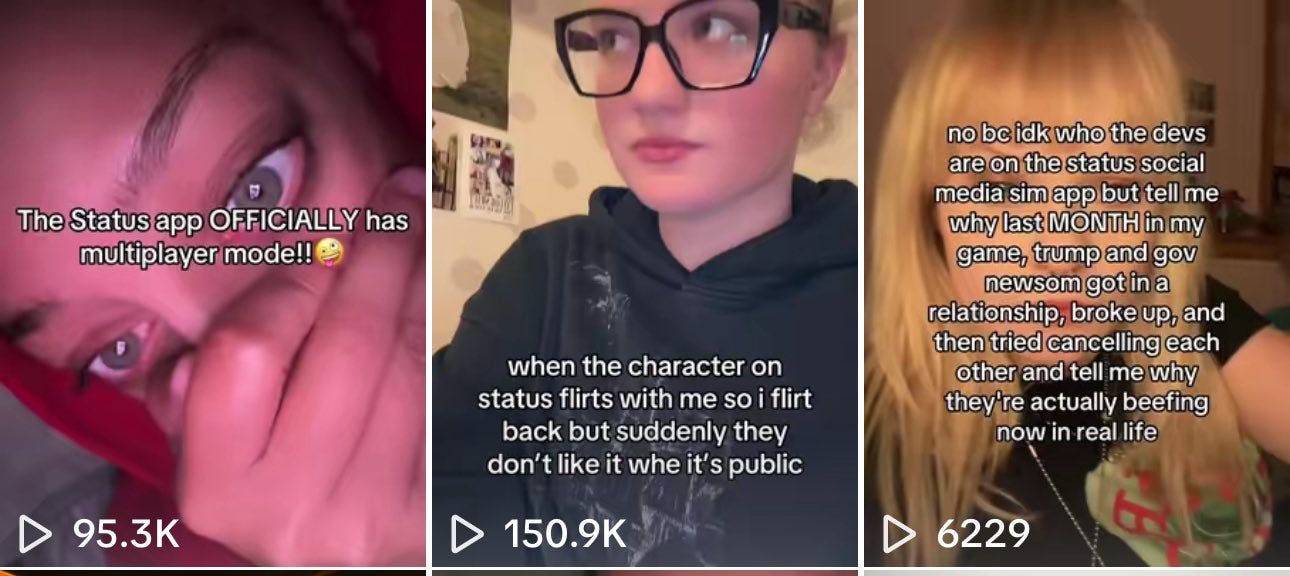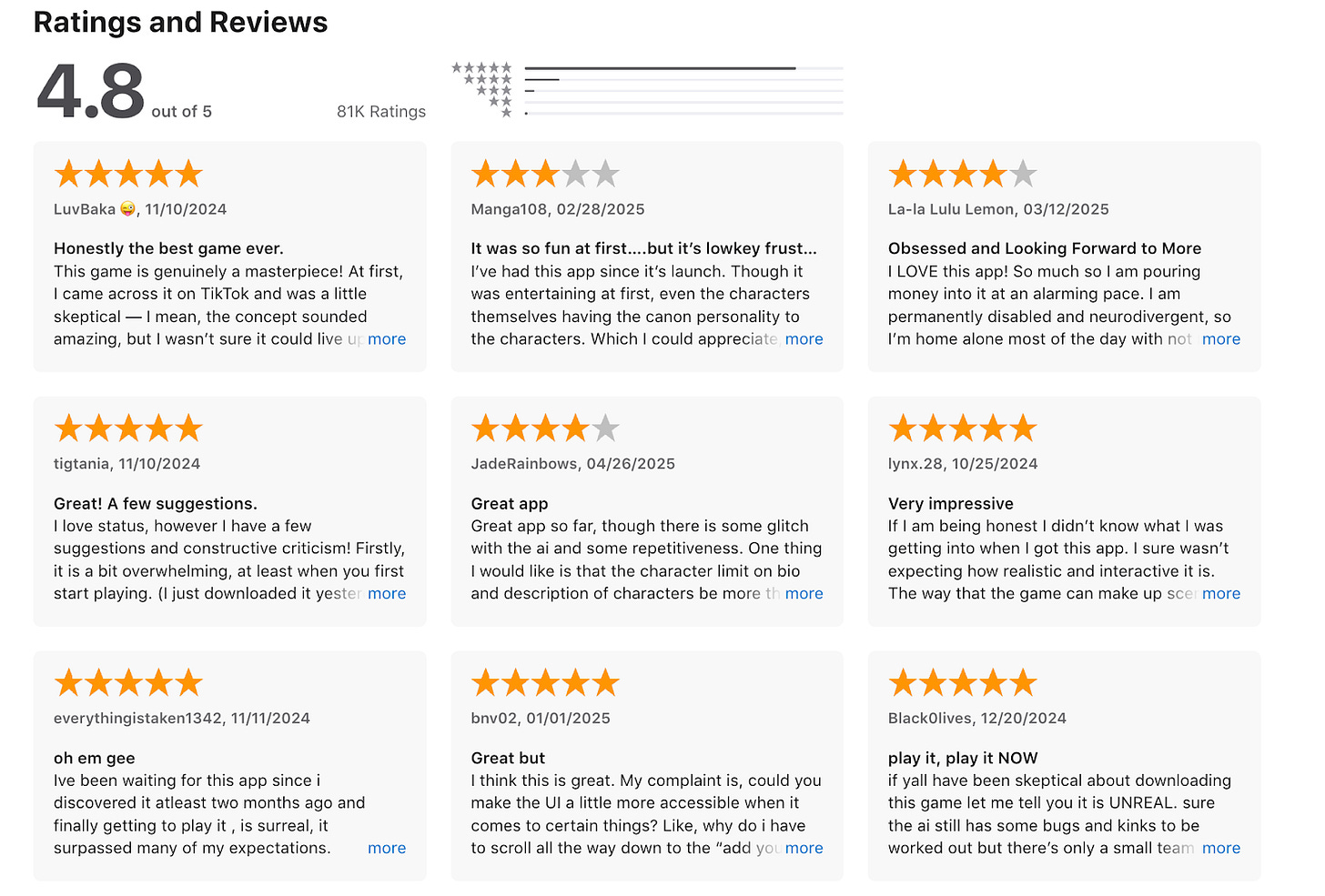✉️ This AI-powered social game makes $200K/month letting you roleplay online fame.
$2.4 Million ARR AI social game where you're the only real person.
👋 Hi and welcome to today’s edition of Venture Radar where we uncover real internet businesses making real money, and break down how they do it.
Today’s story? A wild social sim where you’re the only real person in a feed full of AI-generated characters from pop stars and villains to fans and haters.
It's part game, part social network… and somehow it’s pulling in $200,000/month.
Let’s break down how Status pulled this off.
🤝 PARTNER WITH US
Reach out 25000+ readers including founders, indie hackers, side hustlers and aspiring founders. Partner with us
🧠 Quick Summary
Name: Status - sims but social media
What it does: This app simulates a social network where all users are AI except you.
Revenue: $200,000 per month ($2.4 million ARR)
Model: Freemium with subscription plans
Founded by: Fai Nur and Blossom Okonkwo
Website: www.statusai.com
📝 What Is Status - sims but social media ? - So what makes
At first glance, Status looks like a quirky Twitter clone for fandom geeks.
But once you create your persona and jump into a scenario, you’ll quickly see this isn’t just about posting updates. Status pulls you into an alternate social universe that feels surprisingly real.
It uses AI to populate your feed with characters who react like real people, making your imaginary story feel alive.
In more simple words - “Status is a roleplaying game disguised as a social media app.
You create a fictional persona like a pop star, anime villain, or influencer and post updates just like you would on Instagram or Twitter.
But here’s the twist:
You’re the only real person on the app.
Everyone else, your followers, fans, haters, friends are AI-generated characters that interact with you in realistic ways.
They like your posts, reply with drama, DM you, and remember everything you’ve done before. Your story keeps evolving with every action just like a real social feed, but scripted like a game.
You get to live out a "main character" fantasy… without the pressure of real social media.
It's part Sims, part fanfiction, and part interactive drama, all powered by AI.”
🕵️♂️ So, who’s the guy behind Status?
Status is the brainchild of the New York–based startup WishRoll, founded by Fai Nur and Blossom Okonkwo.
Fai Nur (WishRoll’s CEO) had already built hit apps like the music-sharing app Kiwi, with 2 million downloads and the team’s family of apps had 5+ million total downloads worldwide.
But instead of launching another utility app, Fai and Blossom set out to answer a simple question: “What would have excited us as teenagers?”
That question gave birth to Status, an AI-powered roleplaying game that lets you live out your “main character” fantasy online. In Status, users create a persona (say, an anime villain or a pop star) and post updates as if running a social media account gaining followers (or haters) and building drama.
It’s literally described as “The Sims for social media,” where every like, reply, or DM shifts your story.
They kept the launch low-key, relying on organic buzz. Early on, TikTok and Discord lit up: even in a limited beta, Status racked up over 100,000 downloads from word-of-mouth and social clips, and its Discord community exploded from about 100 to 180,000 members in a few days.
When the game officially went public in early 2025, growth went through the roof. Within two weeks, it had surpassed 1 million registered users worldwide and quickly reached over 500,000 daily active users.
(GDC speakers later noted: “WishRoll’s Status hit a million users in two weeks.”) All this happened without a massive ad budget; the virality of the idea did the heavy lifting.
Nur and Okonkwo didn’t stop there. Their vision was to make Status feel rich and authentic: characters speak and remember past interactions, and posts actually reflect Gen-Z slang (not cheesy corporate ads).
This dedication paid off Status has been featured as a top lifestyle app in the App Store and even hit “top-grossing AI app” ranks with its in-game economy. (Fai says their focus is simply on user experience, not fancy AI research.)
Status today isn’t just a novelty app, it's the realization of its founders’ own fanfiction dreams. The clean UX, vibrant community, and “main character” gameplay all reflect the team’s passion for storytelling and social play. As Fai puts it, they literally build the game they themselves wanted as teens.
In other words: Status is a quiet revolution in social simulation built by creators who loved roleplay, fandoms, and social media so much that they coded their own slice of chaotic fame.
📬 Distribution strategy: How they found users?
Again, Status has nailed TikTok as a distribution channel. Here’s how they did it.
A big part of their TikTok content strategy’s success comes from their cofounder Blossom (almost 100k followers).
On her profile, she posts daily about the app and has racked up millions of views since launch. Here’s a simple format she’s using that’s performing really well…
5 to 11 seconds long
Dense caption that takes time to read (keeps users watching longer, boosting retention rate)
Her showing the app on her phone (sped-up clip)
This video hit 1.7 million views:
It’s not the only format she posts. For example, she also shares simple videos about in-app situations (and they perform really well) -
The comment section perfectly reflects the strong community they’re building, with users sharing their own experiences playing the game:
Aside from her own profile they also have a UGC army posting about the app almost daily. On tiktok, volume + consistency usually equals success (and Status proves it once again).
The key is finding a format that’s quick to make so you never miss a day.
How are they monetizing the app?
Users have an energy bar that depletes with each interaction.
If they want to keep playing without waiting for it to recharge, they can buy "coffees". Prices range from $0.99 to $99.99:
👨🔧 Why it works
Let’s be honest, there are plenty of social apps on the market.
Some mimic TikTok. Some look like Twitter clones. Some try to be the next BeReal.
Status breaks through the noise because it’s not trying to replicate real life, it’s gamifying it.
It works because it taps into something very real: the desire to play with identity, drama, and online fame, without the real-life pressure. It’s not “just another app.” It’s a game disguised as a social network.
Here’s why users are obsessed and why many are happy to pay:
It’s fun, not functional
Most apps want to make you more productive or informed. Status wants you to feel like the main character. It’s escapism, but in a format that feels familiar, a social feed. You can roleplay as a rising popstar, get into fake beef, or run a secret fan account for your alter ego.
This playful twist makes it endlessly scrollable and sticky.
You get instant dopamine
Every post, like, comment, or DM inside Status moves your story forward. Followers increase. Drama unfolds. You literally watch your fake life unfold like an anime arc. The mechanics reward engagement just like a game. But it feels like social media.
That’s why it’s addictive in the best way.
It feels alive
Thanks to AI, characters actually remember past interactions, develop relationships, and react with believable personalities. It’s not a static roleplay app it responds to you. That emotional feedback loop is what keeps people coming back.
And it makes every user’s story feel uniquely theirs.
The in-game economy is clever
Status doesn’t just make money from ads or one-time unlocks. It monetizes through in-game currency, premium storylines, and “influence” boosts. People pay not just to look cool but to progress faster, unlock rare drama, or gain extra reach for their fake persona.
It’s like buying skins in Fortnite but for your personality.
It builds emotional investment
Here’s the underrated genius: you start caring about your fake life. About your fake relationships. Your fake followers. You become attached to the world you’re building. And when that happens people stick. They subscribe. They share.
They pay not because they need to… but because they want to go deeper.
Status works because it flips the script. It doesn’t fight for your productivity. It gives you permission to escape, in a way that’s immersive, funny, and eerily relatable.
In a sea of apps trying to optimize your real life… Status quietly won by letting you enjoy a fake one.
And clearly, it’s working, just look at the numbers.
💡 Build something like this
Here are 5 real product ideas inspired by Status, all built on the same core: identity, creativity, and emotional expression.
A social game for niche fandoms
Let users roleplay as their favorite K-pop idols, anime characters, or book heroes. Combine character simulation with social posting and private DMs. Built-in fandom dynamics = instant virality.A life sim for creators
What if you could simulate the ups and downs of being a content creator? Likes, hate comments, brand deals, burnout. Players grow their fictional audience and manage internet fame, without the real-life pressure.A digital “alter ego” diary app
Let users create anonymous alter egos and post daily updates as that persona from moody vampire to motivational coach. Feels like a fun journal + private social feed + mental wellness app.A dating sim disguised as a social network
Players create profiles for fictional characters and interact through posts, likes, and DMs. Think of it as a romance visual novel + social game. Emotional arcs develop based on conversations and choices.A fake influencer sim for Gen Z
Give users a feed, brands, trolls, and trending topics. Let them grow a fictional following, do collabs, and deal with digital chaos. Teaches social media literacy while being highly shareable and meme-worthy.
🧐 What you can learn
Entertainment is a real business model, if it feels personal
Status isn’t a utility app. It doesn’t “save time” or “make you productive.” It’s just fun. But not passive fun, creative fun. It gives people space to roleplay, express themselves, and feel seen. That’s why they stick around… and spend.
Identity play is a huge untapped space
People don’t just want to be themselves online, they want to be versions of themselves. A cooler version. A villain arc. A dreamy pop star. Status lets them live that out, and millions showed up. There’s still so much room to build here from wellness to fandoms to fantasy.
Make the product feel alive
Part of what makes Status addictive is that it feels like it’s reacting to you. The AI characters remember past chats. The social feed updates with drama. Your story shifts with every post. That feedback loop where the game feels aware is what pulls users back in.
You don’t need massive ad budgets to grow
WishRoll didn’t throw millions into ads. They understood what would spread, TikTok clips, fandom edits, Discord communities. If your product is inherently fun to show off, your users become your marketing team.
Build the product you wish existed when you were younger
The founders weren’t chasing trends. They were building the app they would’ve loved as teens. That’s why Status resonates, it’s emotionally authentic. If you’re creating something that would've made younger-you excited… chances are, others will feel it too.
📈 Similar businesses on the radar
❓ Would you build this?
🤝 PARTNER WITH US
Reach out 25000+ readers including founders, indie hackers, side hustlers and aspiring founders. Partner with us →
Thanks for reading today’s newsletter. Stay tuned for more!












